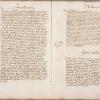Hi Anne,
I will create a transcription and translation later. Nicolas was found guilty of adultery, as he was the father of a child with a woman other than his wife; this child and his mistress had recently died. He was sentenced to a fine of 100 guilders and was also banished from the provinces Holland and Zeeland for 10 years, effective immediatel: he had to leave the city as well as the jurisdiction of Delft before sundown the same day and had to leave the provinces of Holland and Zeeland within the next 3 days. Returning before the 10 years had passes would be sanctioned with flogging.


Anne
zei op dinsdag 25 februari 2025 - 16:37